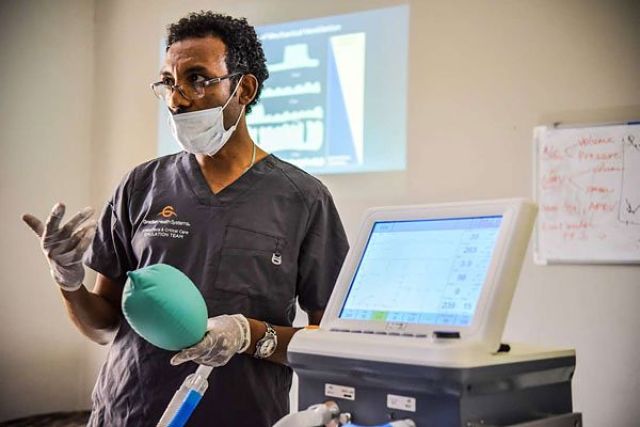 Habtamu Kehali, a trainer of mechanical ventilators, provides training for doctors on how to use mechanical ventilators for the Covid-19 coronavirus patients at the American Medical Center (AMC) in Addis Ababa, on April 1, 2020. PHOTO | MICHAEL TEWELDE | Getty Images
Habtamu Kehali, a trainer of mechanical ventilators, provides training for doctors on how to use mechanical ventilators for the Covid-19 coronavirus patients at the American Medical Center (AMC) in Addis Ababa, on April 1, 2020. PHOTO | MICHAEL TEWELDE | Getty Images
By Dawit Endeshaw
ADDIS ABABA (Reuters) – As the coronavirus epidemic gains a foothold in Ethiopia, Habtamu Kehali’s skills in operating a ventilator may, for increasing numbers of patients, mean the difference between life and death.
Mohamed Adawe, a 21-year-old mechanical engineer, tests his homemade ventilator which he hopes is a local measure to stem the growing spread of the coronavirus disease (COVID-19), at his home in Hodan district of Mogadishu, Somalia May 6, 2020. REUTERS/Feisal Omar
As the country’s only respiratory therapist, Kehali is rushing to train others to run the machines used to keep severely ill COVID-19 patients breathing.
“We only have few patients who are under intensive (coronavirus) care but if the number is going to increase there is a risk that we might see mismanagement of ventilators,” he told Reuters.
“The patient might be exposed to side-effects such as infection and die.”
Ethiopia has 250 confirmed cases of the disease, a tally that has almost doubled over the past eight days, with five fatalities.
The World Health Organisation says around 5% of COVID-19 infections are severe enough to require intensive care and mechanical ventilation.
Health Minister Lia Tadesse told Reuters that Ethiopia had 435 ventilators and planned to buy more, and that around 800 health professionals could operate them.
However, Habtamu said only very few had the necessary specialist skills. Ethiopia had only 12 students on the country’s first course for the entry-level qualification of respiratory technician being supervised by him, he added.
Dr Jannicke Mellin-Olsen, president of the London-based World Federation of Societies of Anaesthesiologists, said doctors and nurses could easily give oxygen to patients using masks or nasal tubes.
But sedating and intubating them – putting tubes into their windpipes to push air from a ventilator into their lungs – was far trickier, “particularly for COVID patients because they have so many pathological changes in their lungs,” she told Reuters.
“This is advanced and specialised medicine – you can easily risk doing more harm than good.”
Habtamu has toured Ethiopian hospitals to review their preparedness for operating ventilators and, since the end of March, put 78 other health workers through two days of training, condensed from an original one-week course.
“We can see that there is a significant gap in the clinical application of these machines …We are trying to narrow that gap.” he said.
His trainees can now serve as support staff, but could not operate ventilators with full confidence on their own, he said, and coronavirus-related travel restrictions mean health workers from outside the capital Addis Ababa can no longer attend training.
“The training is not sufficient and we often get this feedback,” he said. “But we don’t have time.”
—
Related:
Ethiopia Confirmed COVID-19 Cases Reach 272 (LATEST UPDATE)
COVID-19 and Its Impact on African Economies: Q&A with Prof. Lemma Senbet
Webinar on COVID-19 and Mental Health: Interview with Dr. Seble Frehywot
COVID-19: Interview with Dr. Tsion Firew, Ethiopian Doctor on the Frontline in NYC
Ethiopia COVID-19 Response Team: Interview with Mike Endale
Ethio-American Tech Company PhantomALERT Offers Free App to Track & Map COVID-19 Outbreak
‘Your Safety is Our Priority’: How Ethiopian Airlines is Navigating the Global Virus Crisis
Inspiring Amharic Poetry: A Reflection by Shimelis Amare (YouTube)
Getting Through COVID 19: ECMAA Shares Resources With Ethiopian Community
Maryland Issues COVID-19 Fact Sheet in Amharic for Ethiopian Community
Art in the Time of Coronavirus: Guide to Virtual Exhibitions from Ethiopia to U.S.
We Need Seismic Change, Right Now: by Marcus Samuelsson
City Sleeps: A Look At The Empty NYC Streets Amid The Virus – In Pictures
Ethiopia enforces 14-day quarantine for all travelers
Diaspora-based Tech Professionals Launch Ethiopia COVID-19 Response Task Force
Amid COVID-19 Pandemic Hopeful & Inspiring Stories Shared by Obama
Pleas to Diaspora to Assist Coronavirus First Responders in Ethiopia
Coronavirus Sparks an Epidemic of People Helping People in Seattle
Join the conversation on Twitter and Facebook.

























